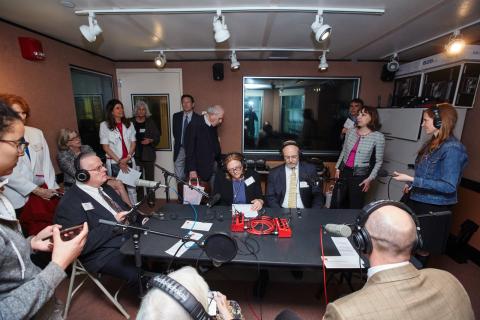Experts Talk at Berklee About Prevalence of Hearing Loss and Importance of Protection

Steven Rauch, M.D., speaks at Just the Right Volume. Behind him is a photo of the hair cells that pick up sound waves inside the ear.
Photo by Dave Green

A group of people at the BIRN record a public service announcement about hearing protection that will air on Spotify.
Photo by Dave Green
Nearly all of us, and young people in particular, have been to a booming concert or pumped that jam on their iPod a notch too loudly. And though we might be struck temporarily hard of hearing afterward, our ears soon regain their previous levels of sensitivity—or so we wrongly think.
In fact, say the experts who spoke at Berklee’s Just the Right Volume event in the David Friend Recital Hall on May 6, we don’t know just how much irreversible damage we’ve done.
The message of the event was, well, loud and clear: the ability to hear is a non-renewable resource that we need to budget for a lifetime but often spend lavishly on musical and other sonic experiences that our ears have not evolved to handle. As a result, hearing damage accumulates without us even being aware of its extent until, suddenly, we are.
“I would make the analogy for you that if you’re standing in the swimming pool and the water is this deep,” Steven Rauch, M.D., the medical director of the Massachusetts Eye and Ear Balance and Vestibular Center, says as he puts his hand just under his nose, “if it gets a half-inch deeper, your life suddenly changes, there’s a big change in your quality of life, but only a half-inch change in the water depth.”
Often patients will come to him reporting that in just the previous few weeks or months, their hearing has gone down. Really, however, their hearing has been going down for a long time but it suddenly became noticeable when they couldn’t, for example, hear conversation despite background noise, Rauch says.
What happens when we crank the tunes is that cells that help us pick up a song’s frequencies can swell and burst, and they never regenerate. After repeated insults, we eventually knock out most or all of the cells for any particular frequency. But until we get to this point, hearing tests cannot detect the damage. We have, says Sharon Kujawa, director of the Department of Audiology at Massachusetts Eye and Ear Infirmary, “hidden hearing loss.”
Musicians Particularly Senstitive to Hearing Loss
Young musicians are especially vulnerable to hearing loss, considering the thousands of hours of practice, often with instruments right next to the ear, it takes to reach mastery.
Audiologist Brian Fligor tells of a 15-year-old violinist he treated at Boston Children’s Hospital for tinnitus, or ringing in the ear. The girl had been practicing five days a week for an hour and a half every day. Fligor measured the sound coming from the girl’s violin and discovered that her sound exposure was six times what would be allowable for a factory worker under federal rules.
He recommended a musician’s earplug and, although the girl’s instructor was “very critical” of it, fearing that it would hurt her practice, the girl used it and her tinnitus went away. Not only that, but her practice improved as she stopped holding back on fortissimo passages and practiced longer.
The speakers—who included scientist Charles Lieberman of Mass Eye and Ear, biologist Paul Gross, Berklee associate professor Nalora Steele, author Katherine Bouton, Kerry Steib of Spotify, and Wendy Cheng of the Association of Adult Musicians with Hearing Loss—emphasized the need to raise awareness about hearing loss and to educate people about protecting their ears, whether by musician's earplugs, avoidance of loud environments, drugstore earplugs, or buying headphones that block outside noise so that music can be listened to at a lower volume.
“You’ve got a certain amount; it’s got to last your whole life,” says Rauch. “If you burn through it early on, there’s no way to replace that resource. So you really have to budget your hearing for a lifetime.”
After the talks the group went to the BIRN studios, where Berklee faculty and staff recorded public service announcements about hearing loss that will be played on Spotify starting May 19.
